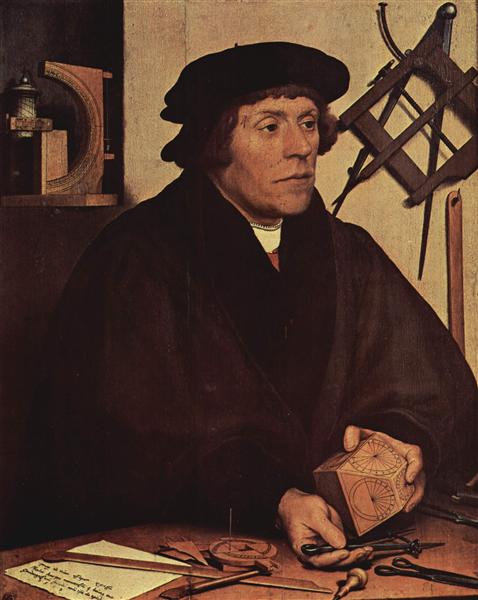Description
Hans Holbein the Younger's 1528 Portrait of Nicholas Kratzer stands as a visual testament to the mastery of Renaissance portraiture and Holbein's ability to capture the essence of his subjects. This portrait not only depicts Nicholas Kratzer, an astronomer in the circle of Henry VIII, but also becomes a vehicle of splendour, revealing both the individuality of the sitter and the technical prowess of the artist.
The composition of the work focuses on the figure of Kratzer, who is presented in three-quarters, an angle that allows for an effective visual connection with the viewer. His upright, confident posture suggests both intellectual authority and elevated social status, characteristics that Holbein accentuates through his serene, contemplative facial expression. The meticulous attention to detail in Kratzer’s clothing reinforces this idea of distinction; the rich black cloak, decorated with subtle embroidery, is paired with a white underlayer shirt, creating a contrast that adds depth to the figure. This deliberate use of clothing not only denotes sophistication, but also reflects the character of the era, in which appearance was a manifestation of status.
Colour plays a crucial role in the work, where the dark hues of Kratzer's costume contrast with the lighter, neutral background, further emphasising the central figure. Holbein uses a restrained palette that highlights naturalism, a characteristic feature of his style. This restrained use of colour allows the subtleties of light and shadow to play on the model's skin, giving her an almost three-dimensional appearance. Shadows fall softly, suggesting a deep understanding of human anatomy and light, which is particularly noticeable in the brightness of her face, which evokes an almost palpable sense of vitality.
Another fascinating aspect of this work is its symbolism. To Kratzer’s right is an astrolabe, a symbol of his occupation as an astronomer, which not only reflects his profession but also suggests a link to the search for knowledge and order in the cosmos, relevant both to science and to Renaissance art. This element also establishes a dialogue between science and art, two disciplines that Holbein frequently invokes in his work, thus reflecting the characteristic interconnectedness of the thought of his time.
Holbein's portrayal of Kratzer allows for an almost psychological reading. Kratzer's gaze, which is directed towards the viewer with a mixture of seriousness and curiosity, invites interpretation and reflection, an experience that goes beyond the visual. This act of looking and being looked at creates a unique bond between the portrayed and the observer, transforming the portrait into an interactive experience.
Hans Holbein the Younger, one of the foremost portrait painters of the Renaissance, demonstrates here his technical mastery and keen understanding of human nature. In a broader context, the Portrait of Nicholas Kratzer is part of a tradition of portraits that combine individual representation with social reflection, a theme that resonates in many of the works of the period. The work is a paradigmatic example of how Renaissance portraits do not simply capture appearance, but delve into the psychology and character of the individual, which, under Holbein's expertise, transcends time and finds relevance in the present.
KUADROS ©, a famous painting on your wall.
Hand-made oil painting reproductions, with the quality of professional artists and the distinctive seal of KUADROS ©.
Painting reproduction service with satisfaction guarantee. If you are not completely satisfied with the replica of your painting, we will refund 100% of your money.

